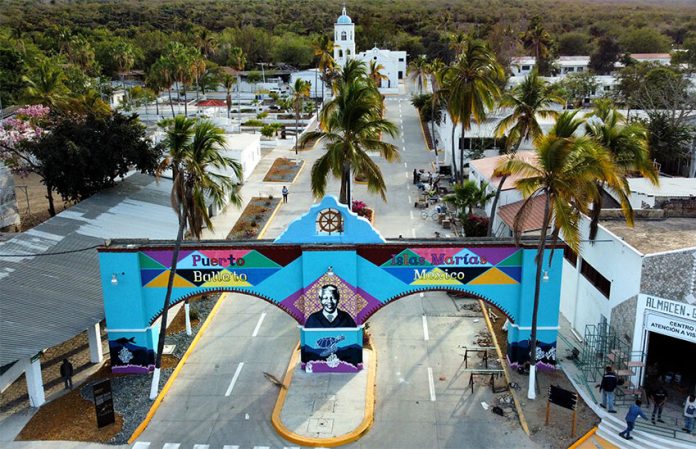An island off the coast of Nayarit where a prison with “walls of water” operated for over 100 years will open to the public as a tourism destination in three months, President López Obrador said Saturday.
Isla María Madre, the largest of four islands in the Islas Marías archipelago, housed a federal prison from 1905 until 2019, when the federal government closed the maritime penitentiary and opened an environmental education center.
In the next chapter of its history, the Pacific Ocean island is set to become an ecotourism destination where visitors will be able to observe seabirds, spend time on the beach and learn about local history. Tours will be managed by the Mexican navy.
“In three months, this island will open for visitors, who will have a lot to see, do, explore and enjoy,” López Obrador said during a visit to Isla María Madre on Saturday.
López Obrador noted that Isla Madre María – an island with a prison that was “famous for cruelty” – has already become a center for recreation, culture, defense of the environment and “knowledge about history and especially literature.”

“What was a hell is becoming a paradise,” he said.
The president criticized the “unjust and aberrant decision” taken in “a not very distant time” to “overpopulate this island with prisoners,” claiming that inmates’ human rights were violated.
He is convinced that the island’s future will be rosier than its past thanks to the decision taken by his government.
Tourists will be able to reach Isla María Madre via boat from San Blas, Nayarit, and Mazatlán, Sinaloa, López Obrador said.
He said that a navy vessel with room for 270 passengers and two ferries to be purchased by the government will take visitors to the island, located about 100 kilometers off the coast of Nayarit.
Tardamos cuatro horas en la travesía desde San Blas hasta la Isla Madre. Como lo dije hoy por la mañana: en tres meses, la gente podrá visitar esta antigua prisión ahora convertida en centro cultural y eco-turístico. pic.twitter.com/mDGknhpjps
— Andrés Manuel (@lopezobrador_) April 9, 2022
It took López Obrador and his companions, among whom were his wife and military officials, four hours to get to Isla María Madre from San Blas, but the new ferries will be able to complete the trip in 2 1/2 hours. Isla María Madre also has a refurbished landing strip on which planes that could fly tourists in from Mexico City in just two hours can touch down.
The president said that people of modest means will be able to visit the island, explaining that there will be cheap accommodation for families.
“It shouldn’t be an island for the elite; we’re going to seek a balance,” López Obrador said.
To avoid damaging the environment, no new buildings will be built to accommodate visitors. Instead, tourists will stay in existing houses where prisoners and prison employees formerly lived. The homes, which are being renovated or rebuilt, are currently occupied by workers preparing the island for tourism.
Arches covered in a colorful mural featuring South African antiapartheid revolutionary and former president Nelson Mandela – who spent 18 years imprisoned on Robben Island – will welcome visitors to Puerto Balleto, the main settlement on Isla María Madre, where prisoners used to work in salt mines and farm shrimp.
Tourists will be able to visit the town’s renovated square, its church – where one priest offered Mass to prisoners for over 30 years – and a museum, where they will learn about notable inmates such as writer José Revueltas, who was imprisoned on Isla Madre María in the 1930s for his political activism in favor of the Mexican Communist Party.
Revueltas wrote a novel called Los muros de agua (The Walls of Water), whose characters were imprisoned on the island and endured its isolation and harsh conditions.
In later years, some prisoners lived with their families in partial freedom and relatively good conditions, the Associated Press reported.
However, “that changed when President Felipe Calderón launched the war against the drug cartels in 2006 and hundreds of new prisoners were sent there,”AP said, noting that the inmate population reached 8,000 in 2013.
With reports from El Universal, Noticieros Televisa and AP
